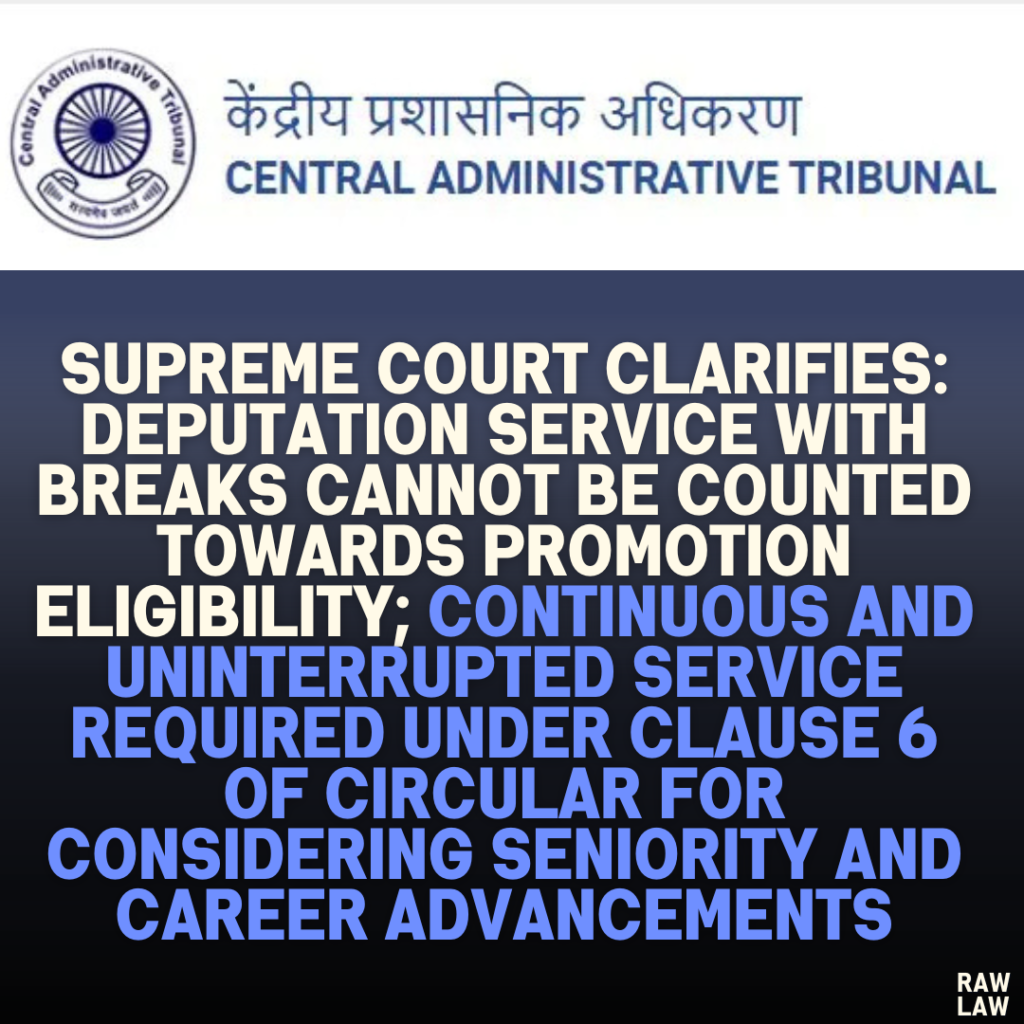Court’s Decision
The Supreme Court allowed the appeal filed by the National Highways Authority of India (NHAI) and overturned the orders of the Central Administrative Tribunal (CAT) and the High Court. The Court ruled that the respondent was not eligible for promotion to the post of Deputy General Manager (Technical) as the respondent’s deputation service before his repatriation to the parent department could not be considered for calculating the four-year minimum service required for promotion under Clause 6 of the Circular dated 22.05.2017.
Facts of the Case
- Initial Appointment and Deputation:
The respondent joined NHAI on deputation as Manager (Technical) in 2008 for three years, but this deputation was extended until 2014. During this period, he served continuously without any gaps. - Repatriation and Direct Recruitment:
In June 2014, the respondent was repatriated to his parent department, the Highways and Minor Ports Department, Tamil Nadu. Afterward, in August 2015, he rejoined NHAI through direct recruitment as Manager (Technical). - Promotion Dispute:
The respondent sought promotion to Deputy General Manager (Technical) under Clause 6 of the 2017 Circular, which allowed deputation service to count as regular service for promotion eligibility. However, NHAI argued that the respondent’s deputation service ended in 2014, and only his direct recruitment period (starting August 2015) could be considered for promotion. - CAT and High Court Rulings:
The CAT and subsequently the High Court ruled in favor of the respondent, directing NHAI to count the deputation service from 2008 to 2014 and promote him retrospectively to Deputy General Manager (Technical) with effect from 2017. - Appeal to Supreme Court:
NHAI challenged these rulings in the Supreme Court.
Issues
- Whether the respondent’s deputation service from 2008 to 2014 could be counted for promotion eligibility under Clause 6 of the Circular dated 22.05.2017.
- Whether the respondent fulfilled the eligibility criteria for promotion to Deputy General Manager (Technical) on the relevant date.
Petitioner’s Arguments (NHAI)
- Discontinuity of Service:
NHAI argued that the respondent’s deputation service ended in 2014 when he was repatriated. Since there was a clear gap before his direct recruitment in 2015, his deputation service could not be considered for promotion. - Specific Eligibility Criteria:
Clause 6 of the Circular required uninterrupted service for promotion. Allowing the respondent’s deputation service would violate the intent of the Circular, which was designed to benefit those continuously serving without breaks. - Consistency with Precedents:
NHAI contended that the respondent’s situation differed from other officers who benefited from the Circular since those officers did not have a break in service. - Promotion is Not Automatic:
Promotion required meeting eligibility criteria and undergoing a selection process, including evaluation by a Screening Committee. Even if eligible, the respondent would not automatically be entitled to promotion.
Respondent’s Arguments
- Eligibility Fulfilled:
The respondent argued that his deputation service from 2008 to 2014 fulfilled the four-year service requirement for promotion to Deputy General Manager (Technical). - CAT and High Court Decisions Valid:
The CAT and High Court correctly interpreted the Circular, which explicitly allowed deputation service to count as regular service for promotion. No additional requirement of continuous service was mentioned. - Discrimination:
The respondent claimed that similarly placed officers were promoted under the Circular, but he was arbitrarily excluded despite fulfilling the criteria. - Fairness:
Denying the benefit of deputation service would lead to manifestly arbitrary and inequitable treatment, as he had served longer than other candidates who were promoted.
Analysis of the Law
- Clause 6 of the Circular:
The Court interpreted Clause 6, which treated deputation service as regular service for promotion eligibility, as a one-time measure. It was designed to ensure fairness for candidates serving continuously on deputation or in regular service. - Break in Service:
The Court held that the respondent’s repatriation to his parent department created a clear break in service. This break disqualified him from claiming the benefit of deputation service under Clause 6. - Recruitment Regulations:
The applicable regulations required four years of continuous service as Manager (Technical) for promotion eligibility. Since the respondent rejoined NHAI through direct recruitment in August 2015, his service period began afresh from that date. - Precedent Analysis:
The Court referred to Indu Shekhar Singh v. State of Uttar Pradesh (2006) and Sanjeev Kumar Sharma (2016) to emphasize that past service could only be counted if explicitly allowed by the rules. The respondent’s case did not meet these criteria.
Court’s Reasoning
- Fresh Entry:
The respondent’s direct recruitment in 2015 constituted a fresh appointment unrelated to his earlier deputation service. Thus, his service period for promotion eligibility could only begin from 2015. - No Automatic Entitlement:
The Court clarified that the Circular was not intended to bridge service gaps or allow automatic promotions. The benefit was restricted to candidates who were in continuous service at the time of consideration. - Distinction from Other Cases:
Other officers who benefited from the Circular were in uninterrupted service. The respondent’s case was materially different due to the gap created by his repatriation.
Conclusion
The Supreme Court concluded that the respondent was not eligible for promotion to Deputy General Manager (Technical) with effect from 2017. His service from 2015 onward would be the only period considered for future promotions. The orders of the CAT and High Court were set aside.
Implications
- Clarification of Deputation Rules:
The judgment provides clarity on the scope of deputation service for promotion eligibility and emphasizes the need for uninterrupted service. - Promotion Criteria Standardized:
The ruling ensures uniform application of promotion criteria, preventing arbitrary interpretations of Circulars and rules. - Impact on Future Disputes:
The judgment may influence future cases involving deputation and promotion disputes, reinforcing the importance of clear eligibility criteria.



